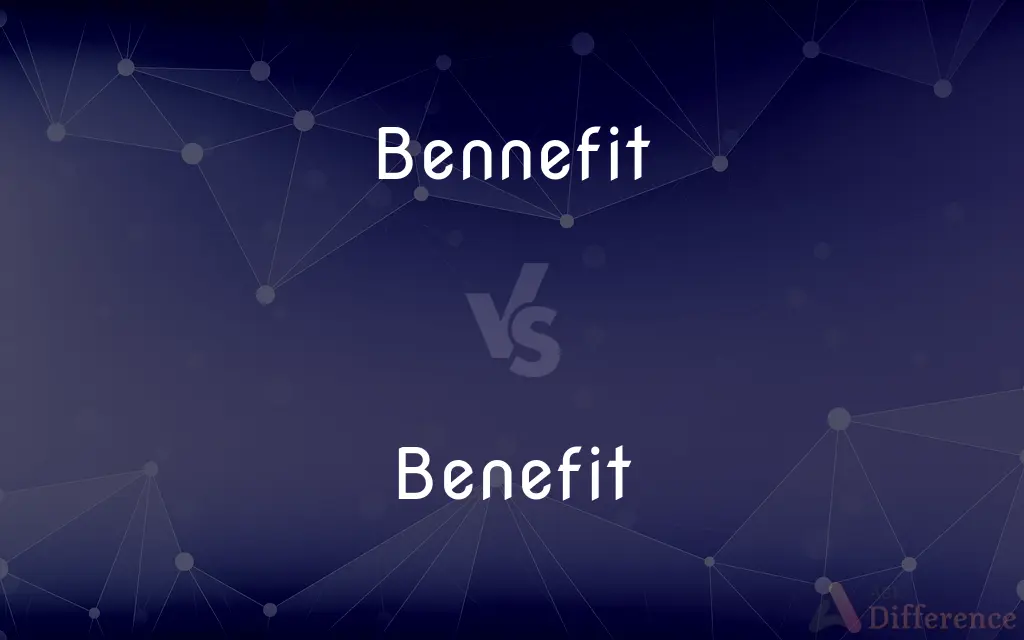Bennefit vs. Benefit — Which is Correct Spelling?
Edited by Tayyaba Rehman — By Fiza Rafique — Updated on April 3, 2024
"Bennefit" is an incorrect spelling, while "benefit" is the correct spelling representing an advantage or profit gained.

Table of Contents
Which is correct: Bennefit or Benefit
How to spell Benefit?

Bennefit
Incorrect Spelling

Benefit
Correct Spelling
ADVERTISEMENT
Key Differences
Relate "benefit" with "fit" as something that fits well provides benefits.
Associate "benefit" with "better" since both convey a positive improvement.
Remember "benefit" has only one 'n'.
Think of "fit" as a positive outcome, making you remember the ending.
The word "benefit" is shorter, just like the benefits in life that come briefly and positively.
ADVERTISEMENT
How Do You Spell Benefit Correctly?
Incorrect: She explained the bennefit of regular exercise.
Correct: She explained the benefit of regular exercise.
Incorrect: One major bennefit of reading is improving vocabulary.
Correct: One major benefit of reading is improving vocabulary.
Benefit Definitions
An advantage or profit gained from something.
The benefit of exercise is improved health.
A payment or gift made by an employer or the state.
She receives unemployment benefits.
A favorable aspect of something.
The benefit of the doubt was given to him.
An advantage or profit gained from something
Enjoy the benefits of being a member
The changes are of benefit to commerce
A payment made by the state or an insurance scheme to someone entitled to receive it
Part-time jobs supplemented by means-tested benefits
Families on benefit
An event such as a concert or game that is intended to raise money for a particular player or charity
A benefit gig
The social season was highlighted by debutante balls and charity benefits
Receive an advantage; profit
The areas would benefit from regeneration
Something that promotes or enhances well-being; an advantage
The nurse explained the benefits of regular exercise.
Help; aid
The field trip was of great benefit to the students.
A payment made by a government agency or insurance company to qualifying persons in time of need
An increase in welfare benefits.
A form of compensation, such as paid vacation time, subsidized health insurance, or a pension, provided to employees in addition to wages or salary as part of an employment arrangement. Also called fringe benefit.
A public entertainment, performance, or social event held to raise funds for a person or cause.
(Archaic) A kindly deed.
To be helpful or useful to.
To derive benefit
You will benefit from her good example.
An advantage; help or aid from something.
She can't read, so the voice recording was made for her benefit.
Exposure to cutting-edge technologies is one of the benefits of the job.
(insurance) A payment made in accordance with an insurance policy or a public assistance scheme.
An event, such as a theatrical performance, given to raise funds for some cause.
(obsolete) beneficence; liberality
Intended audience (as for the benefit of).
The whole scene was staged for his benefit, and it completely fooled him.
Since my wife is Canadian, whenever we have dinner with my family, they keep bringing up anything they've heard about Canada lately for her benefit.
(transitive) To be or to provide a benefit to.
(intransitive) To receive a benefit (from); to be a beneficiary.
An act of kindness; a favor conferred.
Bless the Lord, O my soul, and forget not all his benefits.
Whatever promotes prosperity and personal happiness, or adds value to property; advantage; profit.
Men have no right to what is not for their benefit.
A theatrical performance, a concert, or the like, the proceeds of which do not go to the lessee of the theater or to the company, but to some individual actor, or to some charitable use.
Beneficence; liberality.
Natural advantages; endowments; accomplishments.
To be beneficial to; to do good to; to advantage; to advance in health or prosperity; to be useful to; to profit.
I will repent of the good, wherewith I said I would benefit them.
To gain advantage; to make improvement; to profit; as, he will benefit by the change.
Financial assistance in time of need
Something that aids or promotes well-being;
For the common good
A performance to raise money for a charitable cause
Derive a benefit from;
She profited from his vast experience
Be beneficial for;
This will do you good
An event to raise money for a particular purpose.
They organized a benefit concert for the victims.
To gain or receive an advantage.
Many students benefit from online learning.
Benefit Meaning in a Sentence
He donated generously for the benefit of the hospital.
Exercising outdoors has the added benefit of fresh air.
The project will benefit the entire community.
Understanding these concepts will benefit your overall education.
The fund was set up for the benefit of the employees' families.
Investing early has the benefit of compound interest.
The conference will benefit professionals in the industry.
She uses her platform for the benefit of raising awareness about environmental issues.
Traveling has the benefit of broadening your perspective.
Benefit Idioms & Phrases
Benefit of the doubt
To believe someone's statement, without proof, when the truth is questioned.
I'll give you the benefit of the doubt, but please make sure you're on time in the future.
To benefit greatly
To receive a lot of advantages or positive outcomes from something.
She benefited greatly from her time studying abroad.
Common Curiosities
What is the root word of benefit?
The root word is the Latin "beneficium," meaning "good deed."
What is the singular form of benefit?
The singular form is "benefit."
Which preposition is used with benefit?
The prepositions "of" (benefit of) or "to" (benefit to) can be used.
What is the verb form of benefit?
The verb form of "benefit" is also "benefit" (e.g., "This will benefit you.")
Is benefit an abstract noun?
Yes, when referring to an advantage or profit, it's an abstract noun.
Which article is used with benefit?
Both "a" and "the" can be used with "benefit."
What is the pronunciation of benefit?
The pronunciation is /ˈbɛnəfɪt/.
Why is it called benefit?
It is called "benefit" because it denotes an advantage or positive outcome derived from a particular action or situation.
Which vowel is used before benefit?
The vowels "a" or "the" can be used before "benefit," depending on context.
Is benefit a noun or adjective?
"Benefit" is primarily a noun but can also be a verb.
Is benefit a countable noun?
Yes, "benefit" can be countable (e.g., "There are several benefits to this method.")
Which conjunction is used with benefit?
Standard conjunctions like "and" or "or" can be used with "benefit."
Is benefit a collective noun?
No, "benefit" is not a collective noun.
What is a stressed syllable in benefit?
The first syllable, "ben," is stressed.
What is the opposite of benefit?
The opposite of "benefit" is "disadvantage" or "detriment."
What is the plural form of benefit?
The plural form is "benefits."
What is another term for benefit?
Another term for benefit is "advantage."
What is the third form of benefit?
The third form as a verb is "benefited" or "benefit" in British English.
Is the word benefit imperative?
No, "benefit" itself is not imperative.
How many syllables are in benefit?
There are three syllables in "benefit."
Which determiner is used with benefit?
Determiners like "the," "this," or "a" can be used with "benefit."
What is the first form of benefit?
The first form as a verb is "benefit."
Is benefit an adverb?
No, "benefit" is not an adverb.
Is benefit a negative or positive word?
"Benefit" is generally a positive word.
Is benefit a vowel or consonant?
"Benefit" is a word composed of both vowels and consonants.
Is the benefit term a metaphor?
Not in itself, but it can be used metaphorically in some contexts.
How do we divide benefit into syllables?
Benefit is divided as ben-e-fit.
What part of speech is benefit?
"Benefit" can be a noun or a verb.
What is the second form of benefit?
The second form as a verb is "benefited" or "benefit" in British English.
How is benefit used in a sentence?
Example: The health benefits of regular exercise are well-documented.
Share Your Discovery

Previous Comparison
Nigth vs. Night
Next Comparison
Excellense vs. ExcellenceAuthor Spotlight
Written by
Fiza RafiqueFiza Rafique is a skilled content writer at AskDifference.com, where she meticulously refines and enhances written pieces. Drawing from her vast editorial expertise, Fiza ensures clarity, accuracy, and precision in every article. Passionate about language, she continually seeks to elevate the quality of content for readers worldwide.
Edited by
Tayyaba RehmanTayyaba Rehman is a distinguished writer, currently serving as a primary contributor to askdifference.com. As a researcher in semantics and etymology, Tayyaba's passion for the complexity of languages and their distinctions has found a perfect home on the platform. Tayyaba delves into the intricacies of language, distinguishing between commonly confused words and phrases, thereby providing clarity for readers worldwide.


































